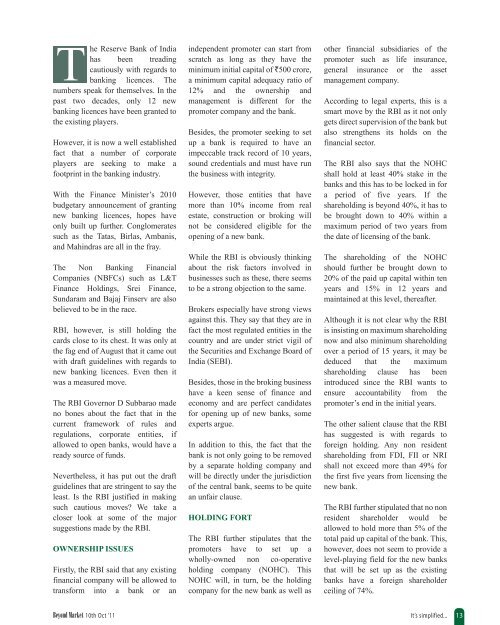Take me to PDF file - Online Share Trading
Take me to PDF file - Online Share Trading
Take me to PDF file - Online Share Trading
You also want an ePaper? Increase the reach of your titles
YUMPU automatically turns print PDFs into web optimized ePapers that Google loves.
The Reserve Bank of India<br />
has been treading<br />
cautiously with regards <strong>to</strong><br />
banking licences. The<br />
numbers speak for themselves. In the<br />
past two decades, only 12 new<br />
banking licences have been granted <strong>to</strong><br />
the existing players.<br />
However, it is now a well established<br />
fact that a number of corporate<br />
players are seeking <strong>to</strong> make a<br />
footprint in the banking industry.<br />
With the Finance Minister’s 2010<br />
budgetary announce<strong>me</strong>nt of granting<br />
new banking licences, hopes have<br />
only built up further. Conglo<strong>me</strong>rates<br />
such as the Tatas, Birlas, Ambanis,<br />
and Mahindras are all in the fray.<br />
The Non Banking Financial<br />
Companies (NBFCs) such as L&T<br />
Finance Holdings, Srei Finance,<br />
Sundaram and Bajaj Finserv are also<br />
believed <strong>to</strong> be in the race.<br />
RBI, however, is still holding the<br />
cards close <strong>to</strong> its chest. It was only at<br />
the fag end of August that it ca<strong>me</strong> out<br />
with draft guidelines with regards <strong>to</strong><br />
new banking licences. Even then it<br />
was a <strong>me</strong>asured move.<br />
The RBI Governor D Subbarao made<br />
no bones about the fact that in the<br />
current fra<strong>me</strong>work of rules and<br />
regulations, corporate entities, if<br />
allowed <strong>to</strong> open banks, would have a<br />
ready source of funds.<br />
Nevertheless, it has put out the draft<br />
guidelines that are stringent <strong>to</strong> say the<br />
least. Is the RBI justified in making<br />
such cautious moves? We take a<br />
closer look at so<strong>me</strong> of the major<br />
suggestions made by the RBI.<br />
OWNERSHIP ISSUES<br />
Firstly, the RBI said that any existing<br />
financial company will be allowed <strong>to</strong><br />
transform in<strong>to</strong> a bank or an<br />
independent promoter can start from<br />
scratch as long as they have the<br />
minimum initial capital of `500 crore,<br />
a minimum capital adequacy ratio of<br />
12% and the ownership and<br />
manage<strong>me</strong>nt is different for the<br />
promoter company and the bank.<br />
Besides, the promoter seeking <strong>to</strong> set<br />
up a bank is required <strong>to</strong> have an<br />
impeccable track record of 10 years,<br />
sound credentials and must have run<br />
the business with integrity.<br />
However, those entities that have<br />
more than 10% inco<strong>me</strong> from real<br />
estate, construction or broking will<br />
not be considered eligible for the<br />
opening of a new bank.<br />
While the RBI is obviously thinking<br />
about the risk fac<strong>to</strong>rs involved in<br />
businesses such as these, there seems<br />
<strong>to</strong> be a strong objection <strong>to</strong> the sa<strong>me</strong>.<br />
Brokers especially have strong views<br />
against this. They say that they are in<br />
fact the most regulated entities in the<br />
country and are under strict vigil of<br />
the Securities and Exchange Board of<br />
India (SEBI).<br />
Besides, those in the broking business<br />
have a keen sense of finance and<br />
economy and are perfect candidates<br />
for opening up of new banks, so<strong>me</strong><br />
experts argue.<br />
In addition <strong>to</strong> this, the fact that the<br />
bank is not only going <strong>to</strong> be removed<br />
by a separate holding company and<br />
will be directly under the jurisdiction<br />
of the central bank, seems <strong>to</strong> be quite<br />
an unfair clause.<br />
HOLDING FORT<br />
The RBI further stipulates that the<br />
promoters have <strong>to</strong> set up a<br />
wholly-owned non co-operative<br />
holding company (NOHC). This<br />
NOHC will, in turn, be the holding<br />
company for the new bank as well as<br />
other financial subsidiaries of the<br />
promoter such as life insurance,<br />
general insurance or the asset<br />
manage<strong>me</strong>nt company.<br />
According <strong>to</strong> legal experts, this is a<br />
smart move by the RBI as it not only<br />
gets direct supervision of the bank but<br />
also strengthens its holds on the<br />
financial sec<strong>to</strong>r.<br />
The RBI also says that the NOHC<br />
shall hold at least 40% stake in the<br />
banks and this has <strong>to</strong> be locked in for<br />
a period of five years. If the<br />
shareholding is beyond 40%, it has <strong>to</strong><br />
be brought down <strong>to</strong> 40% within a<br />
maximum period of two years from<br />
the date of licensing of the bank.<br />
The shareholding of the NOHC<br />
should further be brought down <strong>to</strong><br />
20% of the paid up capital within ten<br />
years and 15% in 12 years and<br />
maintained at this level, thereafter.<br />
Although it is not clear why the RBI<br />
is insisting on maximum shareholding<br />
now and also minimum shareholding<br />
over a period of 15 years, it may be<br />
deduced that the maximum<br />
shareholding clause has been<br />
introduced since the RBI wants <strong>to</strong><br />
ensure accountability from the<br />
promoter’s end in the initial years.<br />
The other salient clause that the RBI<br />
has suggested is with regards <strong>to</strong><br />
foreign holding. Any non resident<br />
shareholding from FDI, FII or NRI<br />
shall not exceed more than 49% for<br />
the first five years from licensing the<br />
new bank.<br />
The RBI further stipulated that no non<br />
resident shareholder would be<br />
allowed <strong>to</strong> hold more than 5% of the<br />
<strong>to</strong>tal paid up capital of the bank. This,<br />
however, does not seem <strong>to</strong> provide a<br />
level-playing field for the new banks<br />
that will be set up as the existing<br />
banks have a foreign shareholder<br />
ceiling of 74%.<br />
Beyond Market 10th Oct ’11 It’s simplified... 13


